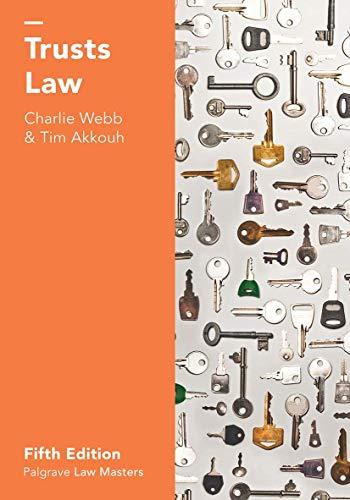Question
5-32: D Corporation is in Chapter 7 bankruptcy. D Corporation owns Blackacre. D Corporation's creditors include F, S, T, U, V, W, X, Y and
5-32: D Corporation is in Chapter 7 bankruptcy. D Corporation owns Blackacre. D Corporation's creditors include F, S, T, U, V, W, X, Y and Z. F has a $700,000 first mortgage on Blackacre; S has a $500,000 second mortgage on Blackacre. Blackacre has a value of $1,000,000. X, Y, and Z each have a claim for $100,000 and are asserting section 507 priorities. D Corporation's only assets other than Blackacre are unencumbered and together have a value of $300,000. Are X, Y, and Z's claim of priority under section 507 important to F? How about to S? What will each creditor receive in D Corporation's case?
5-33: X and Y are both unsecured creditors of D Corp. X agreed to subordinate the payment of its $100,000 claim to the payment of Y's $100,000 claim, In D Corp.'s Chapter 7 bankruptcy, unsecured creditors are receiving a 60% dividend. Assuming X and Y are the only creditors, how much does X receive and how much does Y receive in the case?
5-34: Epstein is the principal shareholder in and creditor of Eppie's, Inc. Epstein initially invested $1,000 and loaned $700,000 to Eppie's Inc. when the company was formed. Eppie's, Inc. is in financial trouble. Epstein tells all of Eppie's, Incs vendors that he intends to loan Eppie's, Inc. another $500,000. Relying on this statement from Epstein, the vendors continue to sell on credit to Eppie's, Inc., but Epstein does not make the new loan. Instead, Eppie's, Inc. files for bankruptcy. Epstein files a proof of claim for the $700,000 he loaned Eppie's, Inc. Should Epstein's claim be disallowed under section 502(b)? (a) Should Epstein's claim be subordinated under section 510(c) to the claims of the vendors who relied on his representation? In this case (and most cases), what is the practical difference between disallowance and subordination? b) If Epstein never misled the company's vendors about his plan to provide more capital, and his debt, therefore, cannot be subordinated under section 510(c), is there an alternative basis for challenging his claim?
5-35: Suppose Markell State Bank ("MSB") has a mortgage on Ponoroff's house in Michigan. After Ponoroff falls behind on his payments, MSB commences foreclosure proceedings and eventually sells the house at public auction to Epstein. The bid from Epstein at the sale was equal to the amount due MSB on its mortgage. Assumne under Michigan law a mortgagor of property that is the borrower's home has the right to redeem foreclosed property, for up to six months following sale, by paying the buyer at the foreclosure sale the amount of its bid, plus interest. Three months after the sale to Epstein, Ponoroff files for Chapter 7 bankruptcy and the trustee in his case, having determined that there was substantial equity in the house over and above the debt owing to MSB, demands that Epstein turnover the property. Must Epstein comply? Recall our earlier discussion of property of the estate. Cf. Schlarman v. Nageleisen (In re Nageleisen), 527 B.R. 258 (Bankr. E.D. Ky. 2015). PLEASE DISCUSS THE CASE
Step by Step Solution
There are 3 Steps involved in it
Step: 1

Get Instant Access to Expert-Tailored Solutions
See step-by-step solutions with expert insights and AI powered tools for academic success
Step: 2

Step: 3

Ace Your Homework with AI
Get the answers you need in no time with our AI-driven, step-by-step assistance
Get Started


